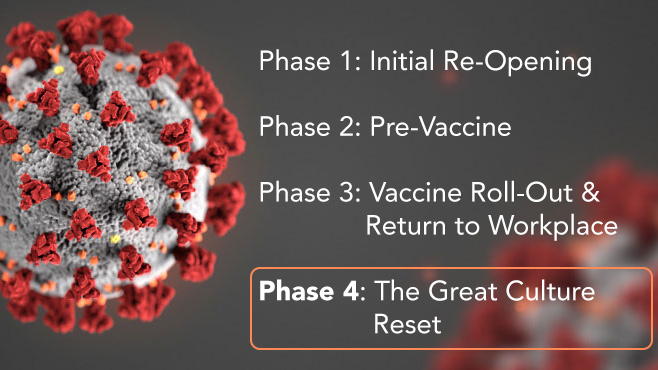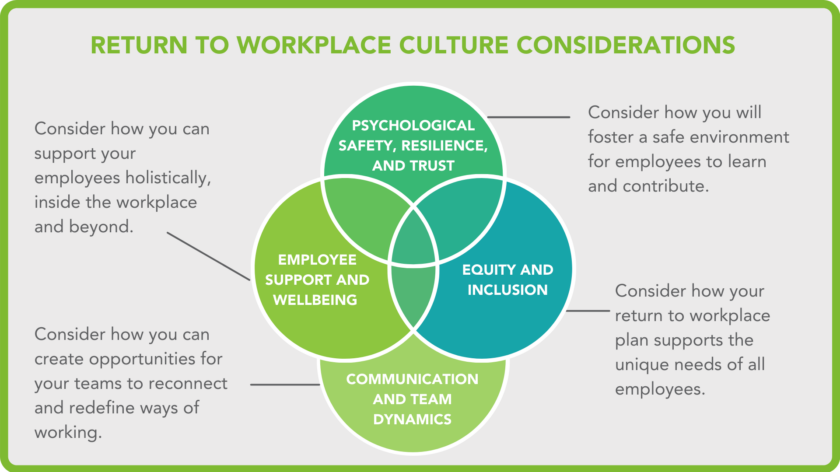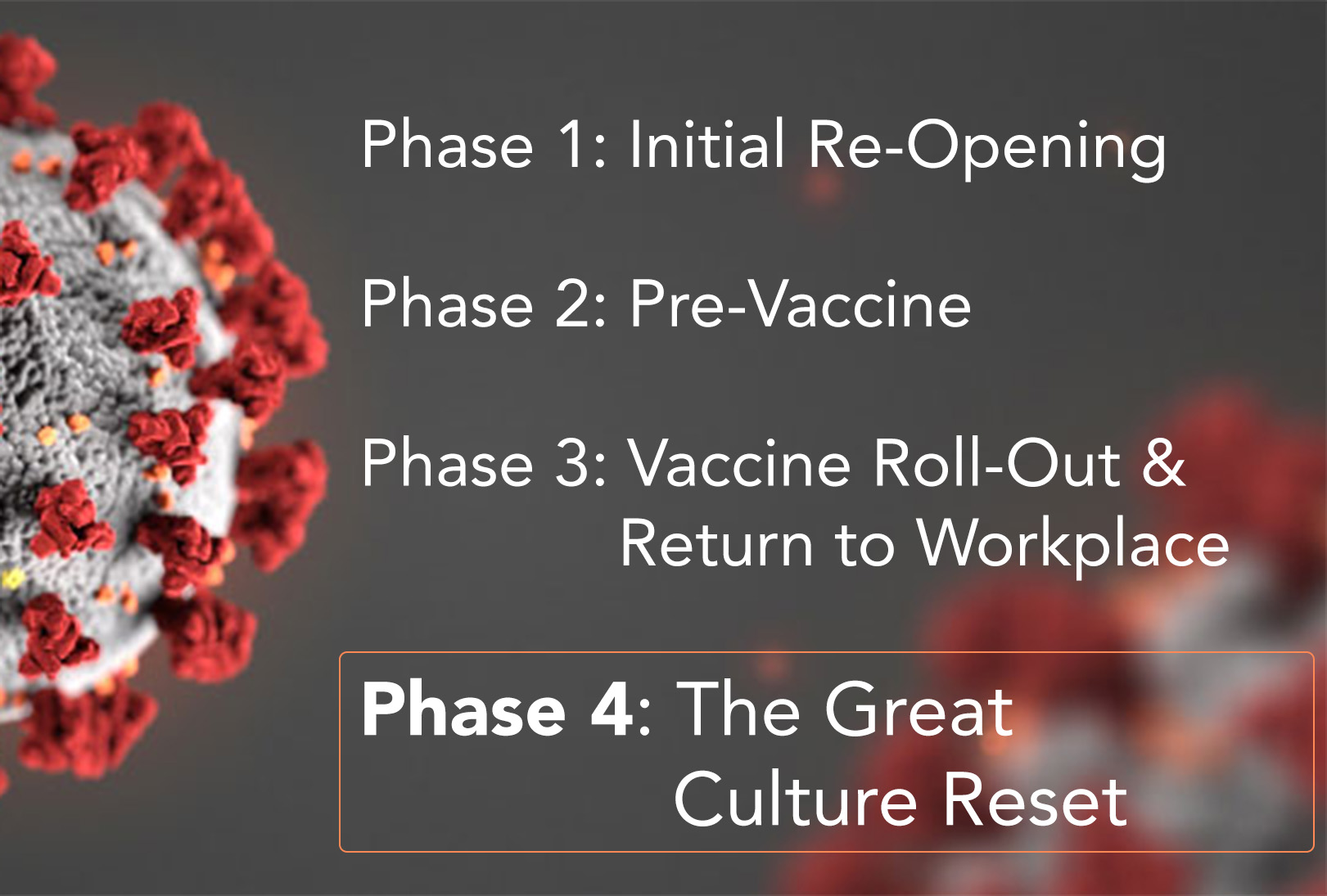The COVID-19 vaccine roll-out is well underway, and with full re-openings and talk of “return to normal”, many business leaders are finalizing or implementing return to workplace plans. While many organizations may have already put significant thought into safely re-opening physical workplaces, there are additional complexities that should be considered that could have far greater implications on the long-term health of the business.
The past eighteen months have irrevocably changed how many employers and employees think about work, and several key trends have emerged that will shape the future and how companies need to think about workplace culture.
- Technology: More than ever, technology has been integrated into the heart of day-to-day operations across all industries. Whereas video conferencing platforms had traditionally been utilized by geographically dispersed teams, they have now become a central method of communication. Additionally, organizations that had never been equipped for remote work quickly created or enhanced digital processes for completing work in the mandated, remote environment ushered in by COVID-19.
- Choice: This shift in working styles has led to a dramatic change in overall perceptions of working from home. Prior to the pandemic, many business leaders were skeptical that employees could be as productive working from home as they are in an office setting. Eighteen months later, the workforce has shown that remote work can not only be effective, but also motivating. With this new foundation of trust, companies need to place a greater focus on employee choice as they move forward, both in work location and schedule.
- Empathy: At its core, the pandemic has deeply affected millions of people all over the world, whether directly or not. Beyond the reach of COVID-19, the past year and a half has also been a time marked by discourse on social justice and racial equity. In response, businesses have had to become more other-centered and invest more in the personal lives and struggles of their team members. Empathy and understanding have come to the forefront of decision making, with team leaders focusing on individual needs and balancing those against the needs of the greater team.

In Vynamic’s fourth and final COVID-19 Business Response Insight, we focus on what business leaders should consider for establishing or re-establishing organizational culture as a part of their return to workplace plans.
(Read the first three Insights in our series on Initial Re-Opening, Leading During the Pre-Vaccination Phase, and Vaccine Roll-Out and Return to Workplaces.)
The importance of culture
Culture drives team performance. Strong cultures are recognizable not just by increased teamwork, but by significantly better business results. Culture fuels a team’s performance by elevating a team’s creativity, agility, and ability to not just create a plan, but flex when issues arise to meet objectives.
With an understanding that culture is paramount, how do leaders know if their cultures are strong or in need of support?
Assessing your culture
Every organization’s culture journey is unique. A successful culture in one organization may not translate effectively to another. As with most strategic initiatives or transformations, the critical first step is to assess where people are and the perception of the current culture.
When beginning an organizational culture assessment, consider the following:
- If the team and internal/external stakeholders were polled tomorrow, would they be able to clearly articulate your organization’s purpose – why the organization exists and the work that it does?
- What is the demographic makeup of your current organization upon your return to the physical workplace? Do you have the right programs and processes in place to foster true belonging for all, including those who may have just joined?
- How will you support employee wellbeing and provide the time and space to ensure psychological safety, resilience, and trust among your team as you shift to the “new normal”?
The importance of culture
With the results of an assessment of what is most important to a company’s people, leaders can begin to put a plan in place for creating or reinvigorating culture. When putting together a roadmap for culture, think of what, how, and when.
- What: What are the goals and opportunities that will help achieve the culture you want or address any gaps identified through your assessment? These can be topics such as resilience, communication styles in a newly defined “normal”, and building a diverse, equitable, and inclusive workforce.
- How: How should these goals and opportunities be implemented? Some objectives may be achieved more quickly through workshops or training sessions, but others may be longer term goals that necessitate new cultural processes and true organizational shifts that require strategic planning and change management.
- When: Once the “what” and “how” have been defined, culture initiatives should be set on a timeline based on when they can reasonably be implemented, measured, and reinforced. The return to the physical workplace provides an opportunity to look in the mirror and reflect on your organization’s culture to determine if anything needs to be reset or redefined.
Culture considerations
Although each company’s culture is unique, there are several key areas of focus on the minds of organizations as they think through their culture roadmaps and return to workplace plans.

- Psychological safety, resilience, and trust: Everyone has been personally challenged during this time. Some, like those in communities of color, have been disproportionately affected by COVID-19 and other traumatic events. Each employee will be returning to workplace life with a unique set of concerns, offering organizations the opportunity to focus in a special way on building resilience and psychological safety in the workplace. Psychological safety exists when team members feel included, accepted, and respected. The team collectively and continuously fosters an environment where it is safe to learn, contribute, challenge the status quo, and take risks without fear of being embarrassed, marginalized, or punished. Since studies have demonstrated that this contributes to positive team performance more than any other factor[endnote id=”61082a4e6bdaf”], it is critical for organizations to cultivate psychological safety post-pandemic.
- Equity and inclusion: Leaders will need to consider how to foster inclusion and create equity within their teams during the return to workplace transition. Recruits who have joined companies over the past two years may have never met their colleagues in person or been in the physical workplace setting. Some employees, if offered the choice, may choose to continue to work virtually instead of returning to the workplace. In any of these scenarios, it is critical to ensure that all employees are appropriately supported during this time of change and feel that they are a part of the organization’s community. When considering equity, organizations should recognize that advantages and barriers exist for their employees and implement processes and policies to address any imbalance. Leaders must be deliberate to ensure equal opportunities for visibility and advancement regardless of physical location and be mindful of the biases that may be present as teams return (or don’t) to the workplace. Developing solutions to promote equity, such as financially supporting a new commute, providing childcare options, or ensuring a virtual or socially distanced option for all team meetings and social events help even the playing field. In a “new normal” where teams may have members in multiple locations with different schedules and specific needs, it is important to approach equity and inclusion with renewed intentionality to create and promote a sense of belonging among all employees.
- Communication and team dynamics: Another clear emphasis as the world begins to transition back to a “new normal” is team communication and corresponding team dynamics. Communication styles can change due to the passage of time or in response to adversity or key life events, so what may have worked once may not be as effective upon returning to the workplace. As such, it will be beneficial for all teams to take time to identify communicational differences between each other and figure out how to best work together.
- Employee support and wellbeing: As organizations return to the workplace, they should build on their momentum from the pandemic and continue to provide empathy and support wellbeing for all employees – even leaders. This can be achieved through coaching, providing a strong support team, or just by making self-care and personal balance a priority and expectation.
Conclusion
COVID-19 has affected what we value most as individuals, and by extension, our approach to work. As organizations prepare to re-enter their workplaces and create a “new normal”, they must step back and reevaluate culture as well. Whether leaders take action or not, the great culture reset is already taking place and employees have high expectations. Capitalize on this moment to reflect on the needs of your teams and how you will step up to meet and support them where they are. Focusing on organizational purpose, core values, and communication will not only ease this upcoming transition, but also ensure that teams are unlocking their greatest potential and providing meaningful results.
Interested in hearing more? Listen to Vynamic’s Trending Health Podcast Episode – “Importance of Culture in Return to Workplace Planning“.
Culture is at the core of Vynamic’s business. Our Culture Curation Service helps organizations motivate teams to drive results. Contact Vynamic to see how we can help you achieve a healthy culture for a more vibrant future.
Citations:
- Edmondson, Amy C. The Fearless Organization. John Wiley & Sons, 2018.

About Vynamic
Vynamic, an Inizio Advisory company, is a leading management consulting partner to global health organizations across Life Sciences, Health Services, and Health Technology. Founded and headquartered in Philadelphia, Vynamic has offices in Boston, Durham NC, New York, and London. Our purpose is simple: We believe there is a better way. We are passionate about shaping the future of health, and for more than 20 years we’ve helped clients transform by connecting strategy to action.
Through a structured, yet flexible delivery model, our accomplished leaders work as an extension of client teams, enabling growth, performance, and culture. Vynamic has been recognized by organizations like Great Place to Work and Business Culture Awards for being leaders and innovators in consulting, company culture, and health. Visit Vynamic.com to discover how we can help transform your
organization or your career.
Want to learn more? Get in touch!
Other insights.
Jump to a slide with the slide dots.
Direct by Design: How Pharma Can Lead the Future of Patient Experience and Interoperability
Discover how pharmaceutical companies can enhance patient experience and interoperability through direct-to-patient (DTP) models.
Read moreScenario Planning Infographic
Boost launch readiness with scenario planning. Learn 5 steps to stay proactive in today’s unpredictable market. Download the infographic.
Read moreAI-Powered Decision Making to Simplify Your Launch Journey: Vynamic Experts on LaunchNav
LaunchNav by Inizio simplifies pharma launches with AI-driven insights, real-time benchmarks, and 800+ launch learnings.
Read more